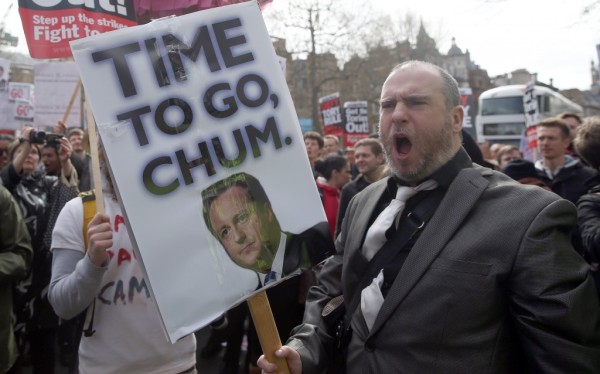 Protesters in London today, Saturday, called on Prime Minister David Cameron to resign after his family’s financial affairs were included in the so-called Panama Papers. This is even as the Nigeria’s Socio-Economic Rights and Accountability Project (SERAP) called on the Code of Conduct Bureau (CCB) to investigate current and past high-ranking public officers in Nigeria named in the Panama Papers.
Protesters in London today, Saturday, called on Prime Minister David Cameron to resign after his family’s financial affairs were included in the so-called Panama Papers. This is even as the Nigeria’s Socio-Economic Rights and Accountability Project (SERAP) called on the Code of Conduct Bureau (CCB) to investigate current and past high-ranking public officers in Nigeria named in the Panama Papers.
Protesters who gathered on Downing Street, where the prime minister’s residence is located, held placards, some of which have inscriptions such as: “Time to go, chum” and “Defy Tori Rule” among others and chanting “What do we want? Cameron out!” and “Get the Tories out!”.
Speaking at his Conservative Party’s spring forum earlier yesterday, Saturday, Cameron said he should have handled scrutiny of his family’s tax arrangements better and promised to learn the lessons. He said it was his responsibility and that Downing Street staff should not be blamed.
“I know that I should have handled this better; I could have handled this better. I know there are lessons to learn, and I will learn them. And don’t blame Number 10 Downing Street, or nameless advisers, blame me,” he said.
Cameron’s admission came several days after negative media coverage and calls for his resignation.
The opposition Labour Party has also demanded Cameron make a statement to Parliament tomorrow, Monday regarding his financial affairs linked to off shore investments.
Leaked documents revealed that Cameron’s late father, Ian, owned part of the Bahamas-based Blairmore Holdings, one of the firms involved, in which the prime minister himself had an active interest until just before taking office.
Downing Street had issued several statements about the offshore companies without mentioning Cameron’s interest.
Thursday, Cameron admitted he had a stake in the fund and sold it for around $42,000 four months before he became prime minister in 2010.
The Panama Papers have also exposed the fact that more than half of the offshore companies implicated in the leak from Panama-based law firm Mossack-Fonseca are registered in British overseas territories.
And in Nigeria, SERAP, in a statement by the Executive Director, Adetokunbo Mumuni, gave the CCB 14 days to carry out the investigation, adding that anyone one found culpable should be sent to the tribunal for prosecution.
It added that if the bureau failed to investigate the cases, the group would not hesitate to use legal means to compel it to discharge that constitutional responsibility.
“SERAP believes that the Panama Papers have shown the extent to which public officers in the country are concealing their stolen wealth in safe havens and secrecy jurisdictions.
“This is contrary to the code of conduct for public officers, which prohibits public officers from maintaining and operating foreign accounts.
“We request Mr. Sam Saba, Chairman, Code of Conduct Bureau, to use his good office and leadership to urgently investigate current and immediate past high-ranking public officers named in the Panama Papers.
“They should also investigate others that are maintaining and operating or have maintained and operated foreign accounts in other safe havens and secrecy jurisdictions, and where appropriate, refer such to Code of Conduct Tribunal for prosecution.”
According to the statement, SERAP hopes that the bureau will learn from the lessons of the Panama Papers to combat the abuse of the asset declaration requirements even as it insisted that high-ranking public officers who use safe havens and secrecy jurisdictions to breach the fundamental requirements of asset declaration must be sanctioned, named and shamed.
According to it, if this is not done, the credibility of the asset declaration regime as a tool of preventing and combating corruption will continue to be doubted.
“SERAP believes that bodies like the Code of Conduct Bureau should now seize the opportunity and use its mandate to react to this international scandal.
“They should take concrete and proactive steps to address increasing breaches of constitutional provisions by high-ranking public officers.
“This action will be entirely consistent with the 1999 Nigerian Constitution (as amended), the law establishing the Bureau, and will meet demands by Nigerians for improvement in transparency regarding asset declarations and sanctions of public officers for breaches.” [myad]






